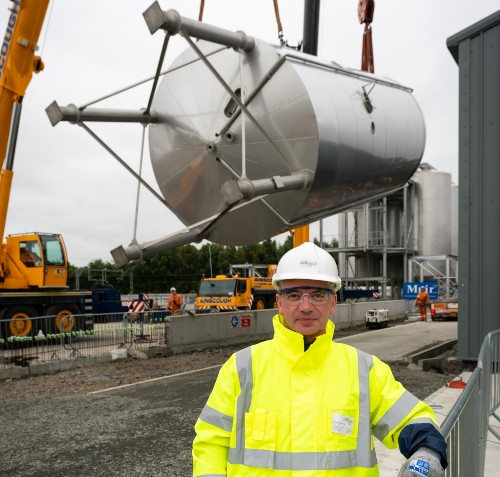Fermentation vessels arrive from the Netherlands
The construction of Scotland’s first biorefinery has taken a significant step forward with the arrival of six purpose-built 130,000-litre fermentation vessels from the Netherlands.
The implementation of Covid-19 restrictions in March prevented the arrival and installation of the vessels at Celtic Renewables’ new biorefinery plant in Grangemouth.
Now, six months on, the pioneering project is back on track and significantly, Scotland’s ambition to develop a low carbon green bioeconomy is closer to becoming a reality.

The Edinburgh Napier University spinout company applies microbiology expertise and modern process technology to produce high-value low-carbon biochemicals and next generation biofuel from biological waste and residues.
The new plant is expected to process around 50,000 tonnes of residues each year from the whisky industry, adding value and sustainability to one of the country’s most important sectors.
Edinburgh Napier University Professor Martin Tangney, Founder of Celtic Renewables, said: “The biotechnology sector is based on innovation and Scotland excels in this aspect, but the really difficult part is converting research into production.
“This landmark event signals our capability to take ground-breaking University research and translate this into a thriving biotechnology industry in Scotland.
“As a business, we have always believed in the transformational impact of our innovation and this is needed now more than ever as we battle with the economic impact of Covid-19. We are delighted to be part of the vanguard of biotechnology innovation in Scotland and look forward to playing our part in growing a new sustainable bioeconomy.”
The Industrial Biotechnology Innovation Centre (IBioIC), the organisation that connects industry, academia and government to bring biotechnology processes and products to the global market, has welcomed the news.
The former Chief Scientific Advisor to the European Commission Prof Dame Anne Glover DBE and Chair of the IBioIC, said: ”IBioIC has an ambitious plan to stimulate the growth of the biotechnology sector in Scotland to a £900 million industry by 2025, and Celtic Renewables is one of the key players in achieving this ambition. This major milestone in the construction of Scotland’s first biorefinery of this scale is not only great for the circular economy but also the wider green recovery. IBioIC is hugely supportive of this sustainability focused approach.”
Attracting Celtic Renewables to Grangemouth has been a significant coup for Falkirk Council which has welcomed Celtic Renewables’ investment in Grangemouth.
Falkirk Council Leader Cecil Meiklejohn said: “Celtic Renewables are important partners in developing the Falkirk and Grangemouth Investment Zone and we are delighted to have worked with them in to establish their plant at Grangemouth. We have established a recovery plan for the area’s economy and the arrival of this new equipment to the site is a tangible sign of our commitment to a green recovery.”